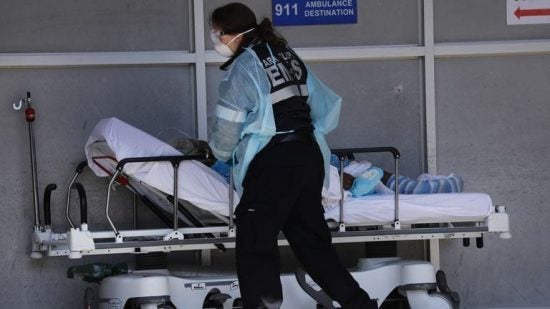“I have nightmares” read the title of the article from the photo above. (Linked in the picture) HCW are struggling, just like we are.
During these stressful times, mental health is often regarded as an essential matter. I couldn’t agree more, but I have yet to see our public leaders address it as the crucial matter to fight this crisis it actually is. Our health care workers are fighting a virus that is not alone; they fight against our prejudices and selfishness as well.
After SARS, Toronto health workers could see an increase of levels of anguish, stress and burn-out. However, exposure to high-risk settings or dealing with infected patients were not the primary determinants, the determinants stressors were the lack of perceived adequacy of training, moral support, and protection
We have yet to assess the risks for long-term psychological effects in our HCW after COVID-19, but we already have some troublesome information.
In China, where the first patients were diagnosed, a survey found that 72% had experienced symptoms of distress. And about half had symptoms of depression and anxiety. Researchers reported that just in the past months,’ one-third had insomnia. According to the study, the primary determinant for their distress: the lack of PPE, personal protection equipment.
In Italy, one of the countries that was hit the hardest by the virus, the prognosis of the reports for HCW is similar, severe anxiety in close to 20%, and self-reported post-traumatic stress disorder symptoms in half of the participants of the study.
Some other countries such as Argentina or Chile have citizens asking doctors not to take the elevator in apartments due to risk of infection, asking them to vacate the premises in some public spaces, to not buy in some supermarkets or, in other places like Mexico, they have thrown bleach and hot coffee to HCW just for fear of infection.
In the US we have yet to know the long term effects this virus will have in the Mental Health of our HCW, in New York doctors and nurses are already experiencing burn-out, lack of PPE and inadequacy of training, all the triggers that were determinant for the long term consequences of their peers in other countries. In some other states, they are faced with backlash and public gatherings against the isolation measures.
They are also facing the cost of making ethical decisions such as maintaining or removing ventilators and choosing the allocation of scarce resources.
Clapping to our HCW every night it’s a nice gesture, I’m sure they appreciate it and feel a morale boost every time they hear it. However, it’s not enough, they require the minimum of PPE to do their job, training, and support, they need our help, not our prejudice or fear, and they are counting on us for doing what we can: social distancing and taking care of the people around us. Only this will give them a chance to flatten the curve.




